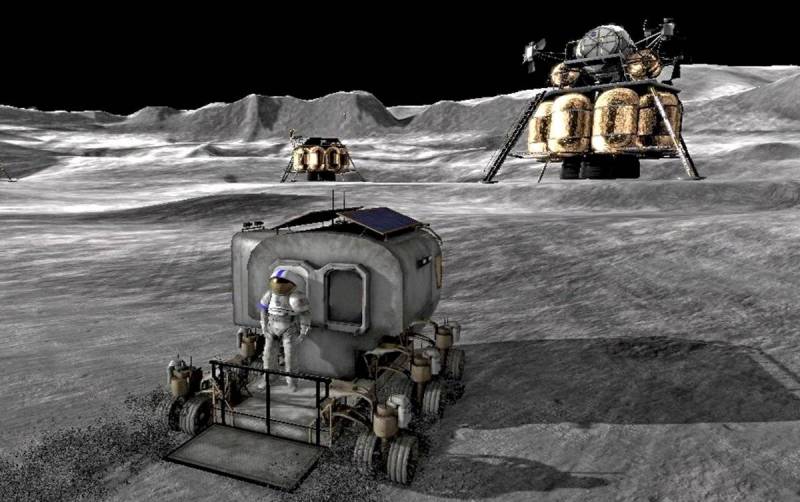Why was Russia excluded from the race for "lunar trillions"?
Recently it became known that our country was expelled from the expert group on the creation of a circumlunar station Gateway. That is, Roskosmos did not come out on its own, but it was expelled from the “other side”, to which the head of the state corporation replied in the spirit that he didn’t really want to. But, if we leave out of brackets this his trademark bravado, will we not end up with a broken trough in the new "moon race"?
The Lunar Orbital Platform-Gateway project is an integral part of the Artemis international satellite exploration program. The near-moon visited orbital station should become a transshipment base for the exploration of the Moon itself and an outpost on the way to Mars and deep space. Despite its "international" status, this space station is in fact American, and the entire project is led by NASA. The USA, Canada, the European Space Agency and Japan became its participants.
Russia was also expected to participate, but the negotiations reached an impasse. Roscosmos was required to create only one docking module for spacewalk, and this had to be done according to American standards. At the same time, the main in the Lunar Orbital Platform-Gateway was objectively the United States, and they did not agree to the equal status of all other participants, as in the ISS. The head of the domestic state corporation was not satisfied with this format, and in the end they ended up where they ended up, which Dmitry Rogozin commented in his own style:
How can you be excluded from some "lunar group" if we have never been there ?!
Let's put emotions aside and think about whether our country should have taken part in this project at least in second or third roles. We need to understand why today Russia really needs the Moon, and whether it is needed at all. Let's look at the list of US partners in the Artemis Agreements: the European Space Agency, Great Britain, Japan, Canada, Australia, Italy, as well as Luxembourg, the United Arab Emirates and even Ukraine, which have joined them. With the first, everything is clear, these are the most developed countries in the world, but the participation in the project of Arab oil sheikhs, an "offshore wallet", and, of course, Ukraine, which, by the way, also has competencies in the field of space of technologies... What could they all need on the moon? Send a woman and another man there? And that's it, they have no more other problems?
Seriously though, the Earth's satellite is a treasure trove of trillions of dollars of minerals that have fallen on it with asteroids for millions of years. These are all kinds of rare earth metals, and helium-3, which can potentially be used as a source of energy. It is clear that at the current level of technology development, industrial development and delivery of all these resources to Earth is unlikely to be profitable. But this is only for now.
It is not hard to guess that the main goal of this lunar program will be to “stake out” the most delicious territories in terms of resource extraction for the future. The moon is considered a universal value, but President Trump has already issued a regulation according to which the United States does not recognize the Agreement on the activities of states on the moon. Whoever did it, he ate it. It would be naive to expect that the first Americans, British, French, Italians and other gentlemen with a rich historical experience of colonization who got on the earth's satellite first will share with those who come after them.
This is well understood in Beijing, where they are rapidly developing their own lunar program. The Chinese already have their own lunar rovers, and soil samples were able to deliver to Earth, and visited the far side of the Moon. And they are actively engaged in a super-heavy launch vehicle. It is clear that they will share the resources of Outland with the United States and its satellites.
And what about Russia? Good News in this direction no. The project of the super-heavy launch vehicle "Yenisei", designed to fly to the Moon, has been shelved. The Roscosmos budget is constantly being sequestered. There are technologies, but there is no money for their implementation. Participation in the Lunar Orbital Platform-Gateway was a chance to somehow participate in the upcoming section of space resources, but it was missed. What then remains? Probably, the only option for Russia not to be left on the sidelines by a broken trough may be an attempt to assemble its own coalition from countries that are not included in the list of the closest friends of the United States, and launch its own alternative lunar project in the format of international cooperation.
- Sergey Marzhetsky
- https://www.nasa.gov/

Information